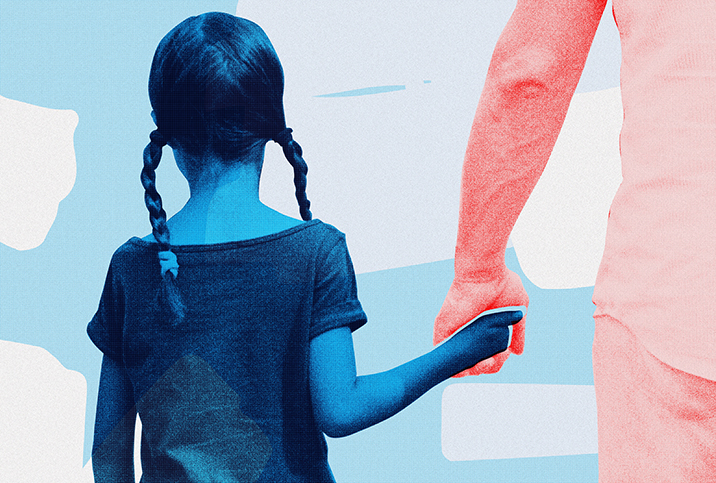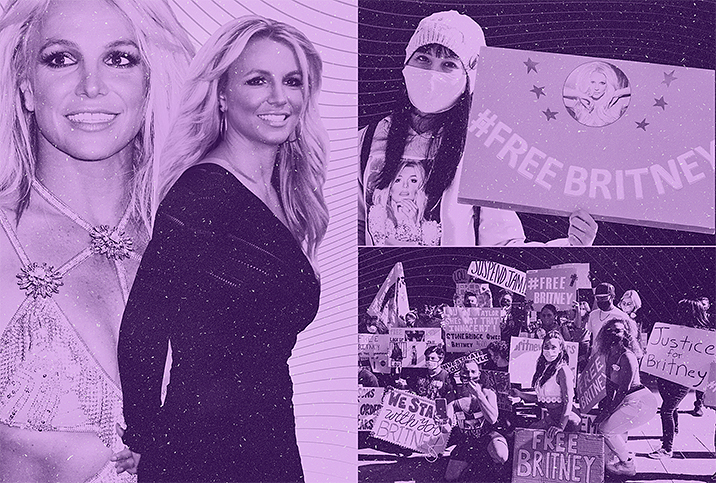'Grooming' Is an Under-Discussed Type of Sexual Abuse

When you think of "grooming," you probably think of rushing to shave or trim "down there" before sex. And you're not wrong—that's an accurate (and relatable) definition. However, we need to talk about another type of grooming that defines a type of sexual abuse. In short, it's when groomers—who are typically sex offenders and/or pedophiles—gain someone's trust by "supporting" them, then abuse them. This can happen both in person and online. The confusing and insidious nature makes it hard to spot, so here's what you need to look for and know.
Grooming 101: How it happens
First, the so-called groomer targets a person who is vulnerable. These people may receive little parental oversight, lack self-confidence or experience mental health challenges. While adults can be victims, an abuser's efforts are typically focused on children and teens because they're more vulnerable to manipulation and don't yet have fully developed brains.
"It is typically less about age and [more about] the need to control and have power over someone helpless and susceptible," said Jessica Steinman, LMFT, a therapist at Westwind Recovery in Los Angeles who works with patients who have a history of sexual abuse. "A cliche or assumption is that groomers can be in their middle age or older, but it truly can be anyone." After targeting the victim, the groomer begins to gain their trust.
"Basic grooming—whether it is for sexual, financial, emotional or even labor exploitation—entails initially gaining the intended victim's trust so they let their guard down," said Sandra Calzadilla, LMHC, a therapist in Florida who specializes in trauma.
Jillian Barberie, TV host and mother of two preteens, reveals how she talks to her kids about sexual safety, including the prevention of online grooming. Watch the full interview here.
Groomers gain trust by isolating the victim and making them feel special. "The perpetrator works to separate the child or adolescent from peers, typically fostering in the child a sense that he or she is special to the groomer, and giving a kind of attention or love to the child that he or she needs," said Beverly Engel, LMFT, a psychotherapist in California and author of "Escaping Emotional Abuse: Healing From the Shame You Don't Deserve" and other books on the topic. "A special relationship can be even more reinforced when a groomer cultivates a sense in the child that he or she is loved or appreciated in a way that others, not even parents, provide."
As the groomer meets the victim's needs, the victim begins to trust and even idealize the groomer to the point of not seeing red flags. "These grandiose efforts mistakenly translate into feeling loved, appreciated and seen...[Victims] are more likely to look past bad behaviors, [thinking] 'how can they be bad if they have done all this for me,'" Calzadilla explained.
Sexual abuse begins when the groomer engages sexually with the victim, often so subtly the victim may not realize it. "Desensitization occurs through talking, showing pictures or videos, or creating situations—like going swimming or taking a shower together—in which both the groomer and victim are naked," Engel said. "At this point, the adult exploits a child's natural curiosity and physical sensations when stimulated to advance the sexuality of the relationship."
And as the groomer crosses each boundary, they gauge the child's reaction and gaslight them. "They can start the mental and emotional abuse by denying they did what they did, or trying to convince the intended victim that what they did or are doing 'isn't that bad' or 'isn't wrong,'" Calzadilla said. Groomers blame, threaten and punish the victim physically and emotionally.
Perhaps scarier, grooming isn't something parents or friends of the victim may easily notice. Groomers can be coaches, clergy, teachers, bosses, tutors and other trusted leaders. Further, groomers "groom" parents, or peers surrounding a victim, into thinking the situation is normal.
"One sign of grooming is a focus and large effort to gain the trust of a child's caregivers, which is a way to gain more access," Steinman said. "Once the groomer has portrayed themselves as a person a caregiver can trust, they may start to let their guard down and allow the groomer to spend more time with their child... A groomer will want to be helpful to the caregiver by helping with chores or activities with the child."
Grooming is a fairly popular TV trope

Grooming happens in real life, most importantly, but also in TV. Whether or not you realized it—it's hard to recognize and often romanticized—you've probably seen these portrayals. Grooming is a storyline in several popular series, such as "Pretty Little Liars," "A Teacher" and Freeform's recent show "Cruel Summer."
In "Pretty Little Liars" we see what appears to be a happy and romantic relationship between characters Ezra and Aria. But when you take a hard look at the facts, namely the age and experience gap between the two, it's easy to see how problematic their relationship is.
"This type of portrayal is televised desensitization of a teacher having a 'relationship' with a 16-year-old student for information...He used her for his own purposes, groomed her to fall in love with him in order to write a book about her and her friends," Calzadilla said. "He crossed several lines—hacking into cameras, keeping pictures of his underage students—but is loved and defended."
This type of abuse is incredibly dangerous, and shouldn't be romanticized in pop culture and in media tropes.
In Hulu's "A Teacher," Claire grooms her student, Eric. "She flirtatiously implies that he is smarter than his friends and offers him half her sandwich. This may seem like a simple and innocent act, but it makes him feel special and picked out of the crowd," Steinman explained. Claire continues to blur the lines by tutoring Eric for free, driving him places, taking him on trips and asking him to call her by her first name.
Lastly, in "Cruel Summer," assistant principal Martin grooms student Kate by being the person who "takes care of her" when she fights with her parents. He makes her believe she isn't safe with anyone but him, then engages in sexual acts with her and kidnaps her when she tries to leave. Only then is Kate able to realize who Martin truly is.
While the latter two shows are more honest about the harms of grooming, the portrayal of these behaviors as "hot" is problematic and can cause victims to think it's okay. And that is what needs discussion.
How to support a survivor
Grooming is a dangerous phenomenon affecting many survivors—including your loved ones, potentially—who need your support. Reaching out for help can be a terrifying step for a survivor, especially when the groomer threatened or punished them. You, as an ally, play a key role in helping them get out and recover.
Engel recommended believing survivors, giving them attention and love, and arranging peer groups for them. Additionally, you can cut the groomer off and help the victim find a therapist who specializes in sexual trauma, according to Steinman.
Grooming is a tricky type of abuse, which means looking out for the signs is even more important. In someone who is underage, look for signs of texting and spending too much time with an adult, especially if they try and keep it a secret. Grooming involves dominance, manipulation and control, something that can also occur in adult relationships. A groomer will manipulate the victim into believing that they are there to take care of them and that they are the only person who cares. By instilling financial, emotional and physical dependence, a groomer will isolate their victim in order to fulfill their needs.
This type of abuse is incredibly dangerous, and shouldn't be romanticized in pop culture and in media tropes. Looking out for signs of grooming can help the public stay aware of these types of tactics in order to protect themselves and their peers.
If you've been groomed or sexually abused, you're not alone and help is available. For support, you can call RAINN at 800-656-4673 or use RAINN's chatline.




















